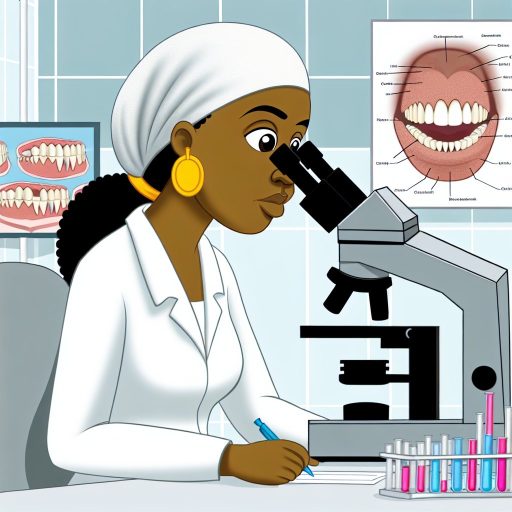Introduction
Nigeria faces significant nutritional challenges that require urgent attention.
With a high prevalence of malnutrition and diet-related diseases, the role of dietitians is crucial in addressing these issues.
Dietitians play a key role in promoting healthy eating habits, designing nutrition plans, and educating the public on the importance of balanced diets.
They are trained professionals who can provide expert advice on how to improve dietary intake and prevent nutritional deficiencies.
By working closely with individuals, communities, and healthcare facilities, dietitians can help combat malnutrition, obesity, and other dietary-related diseases in Nigeria.
Their expertise in understanding the relationship between food and health makes them essential in the fight against nutritional challenges.
Furthermore, dietitians can collaborate with policymakers, food industries, and other stakeholders to develop sustainable strategies for improving nutrition outcomes in the country.
Their input is valuable in creating public health campaigns, advocating for better food policies, and enhancing access to nutritious foods for all Nigerians.
Dietitians play a critical role in addressing the nutritional challenges faced by Nigeria.
Their expertise, advocacy, and dedication to promoting healthy eating habits are vital in improving the overall health and well-being of the population.
Prevalent Nutritional Deficiencies in Nigeria
Vitamin A, iron, and iodine deficiencies are common.
Lack of access to diverse and nutritious foods contributes.
Poor dietary habits and limited food choices worsen deficiencies.
High Rates of Malnutrition and Stunting
Children under five are particularly vulnerable.
Malnutrition is a major public health concern.
Stunting affects physical and cognitive development in children.
Factors Contributing to Nutritional Challenges
Poverty and food insecurity are significant factors.
Limited access to healthcare and nutrition education affects outcomes.
Inadequate sanitation and clean water sources worsen the situation.
Role of Dietitians in Addressing Nutritional Challenges
Dietitians play a crucial role in promoting healthy eating habits.
They educate individuals and communities on proper nutrition.
Dietitians help create personalized meal plans to address deficiencies.
Interventions by Dietitians to Improve Nutrition
Conducting nutrition assessments to identify deficiencies is vital.
They develop nutrition programs tailored to specific needs.
Providing counseling on food choices and meal preparation is key.
Collaboration with Healthcare Professionals
They work with doctors to address malnutrition in medical settings.
Collaboration with community health workers enhances outreach programs.
Partnering with policymakers advocates for nutrition policies.
Using Technology to Enhance Nutrition Education
Utilizing mobile apps tracks food intake and nutrient intake.
Implementing telehealth services allows for remote nutrition consultations.
Engaging with social media provides nutrition tips and recipes.
Research and Advocacy for Improved Nutrition Policies
Research helps understand nutritional challenges better.
Advocating for policies supports access to nutritious foods.
Participating in campaigns raises awareness about malnutrition.
Factors Contributing to Nutritional Challenges
When it comes to addressing nutritional challenges in Nigeria, it is essential to understand the various factors that contribute to this issue.
These factors have a significant impact on the dietary habits and overall nutrition of the population.
Poverty
- High levels of poverty in Nigeria contribute to nutritional challenges as many people cannot afford nutritious foods.
- Poverty leads to inadequate access to essential nutrients, resulting in malnutrition and related health issues.
- Families living in poverty often rely on cheap, high-calorie foods that lack essential vitamins and minerals.
- Lack of financial resources hinders the ability to purchase diverse and balanced diets necessary for good health.
Food Insecurity
- Food insecurity, which is prevalent in Nigeria, contributes to inadequate food availability and accessibility.
- Food insecurity can lead to chronic hunger, inadequate nutrition, and poor health outcomes in the population.
- Unequal distribution of food resources exacerbates food insecurity, affecting vulnerable populations the most.
- Inadequate access to food leads to micronutrient deficiencies and stunted growth in children, among other issues.
Lack of Access to Nutritious Foods
- Many regions in Nigeria lack access to a variety of fresh and nutritious foods due to transportation and distribution challenges.
- Rural areas often face limited availability of fresh produce, dairy, and other nutrient-rich foods.
- Urban areas may have better access to diverse foods, but affordability remains a major barrier for many households.
- Lack of access to nutritious foods hinders the ability to meet dietary requirements for optimal health and well-being.
Impact of Cultural Beliefs and Practices
- Cultural beliefs and practices play a significant role in shaping dietary habits and nutritional choices in Nigeria.
- Traditional food preferences often prioritize carbohydrate-rich and energy-dense foods over nutritious options.
- Cultural celebrations and rituals may involve the consumption of unhealthy foods high in sugar, salt, and unhealthy fats.
- Beliefs about specific foods’ healing properties or nutritional benefits can influence dietary behaviors and food choices.
Addressing nutritional challenges in Nigeria requires a multifaceted approach that considers the complexities of poverty, food insecurity, lack of access to nutritious foods, and cultural influences on dietary habits.
Dietitians play a crucial role in educating and empowering individuals and communities to make informed decisions about their nutrition and health.
Explore Further: Medical Biochemistry Research in Nigeria
Role of Dietitians in Addressing Nutritional Challenges
Dietitians play a crucial role in promoting healthy eating habits by providing expert advice on nutrition.
Transform Your Career with Expert Guidance
Get personalized mentorship consulting that’s tailored to your unique path. Our expert advice is actionable and exclusive.
Get StartedThey work with individuals to create personalized meal plans that meet their dietary needs while ensuring they receive essential nutrients.
By educating people on the importance of balanced nutrition, dietitians help prevent nutrition-related diseases such as obesity, diabetes, and heart disease.
They also provide support and guidance to individuals looking to make healthier food choices, making it easier for them to achieve their health goals.
Dietitians can collaborate with community organizations, schools, and healthcare facilities to develop sustainable nutrition programs.
They can conduct workshops and seminars to raise awareness about the importance of good nutrition and teach people how to make healthy choices.
By partnering with local farmers and food suppliers, dietitians can help communities access fresh and affordable produce.
They can also work with policymakers to advocate for policies that promote healthy eating.
This includes increasing access to nutritious foods in underserved areas.
Overall, dietitians play a vital role in empowering communities to make informed decisions about their diet and improve their overall health.
Gain More Insights: Challenges Facing Nigerian Nutrition and Dietetics Sector
Addressing Nutritional Challenges in Nigeria
Nutritional challenges in Nigeria require effective strategies.
These strategies can improve the overall nutrition status of the population.
They are crucial to combat malnutrition in vulnerable groups.
This includes children, pregnant women, and the elderly.
Promoting Breastfeeding
- Encouraging exclusive breastfeeding for the first six months improves nutritional status.
- Educating mothers on the importance of breastfeeding can increase rates.
- Implementing workplace policies protecting breastfeeding mothers encourages longer durations.
Fortifying Food Products
- Fortifying staple foods with nutrients like iron and vitamin A helps combat deficiencies.
- Collaborating with food producers increases access to fortified products.
- Regulating the fortification process ensures its effectiveness.
Implementing Nutrition Education Programs
- Targeted nutrition education programs can promote healthy eating habits.
- Engaging communities through workshops empowers informed dietary choices.
- Working with schools and health facilities incorporates nutrition education widely.
Collaboration Among Stakeholders
Collaboration between dietitians, healthcare professionals, and policymakers is crucial.
These stakeholders can develop comprehensive strategies to address malnutrition.
Dietitians provide evidence-based nutrition recommendations to individuals.
Healthcare professionals integrate nutrition assessments into routine practices.
Policymakers create an enabling environment for sustainable nutrition interventions.
This multi-faceted approach is essential for improving nutrition in Nigeria.
Find Out More: Top Nigerian Universities for Nutrition and Dietetics

Challenges Faced by Dietitians in Nigeria
Limited resources make it difficult to provide comprehensive nutritional support.
Lack of awareness about the role of dietitians hinders their effectiveness in addressing nutritional issues.
Resistance to change from individuals and communities can be a barrier to implementing healthier dietary habits.
Ways to Overcome These Challenges
Advocacy efforts to raise awareness about the importance of dietitians in public health interventions.
Collaboration with other healthcare professionals to leverage resources and expertise in addressing nutritional challenges.
Establishing partnerships with government agencies and non-profit organizations to secure funding for nutrition programs.
Conducting research and collecting data to demonstrate the impact of dietitians on improving public health outcomes.
Providing education and training opportunities for local communities to empower them to make healthier food choices.
Advocating for the Importance of Dietitians
Dietitians play a crucial role in promoting health and preventing diseases through nutrition education and counseling.
By highlighting the challenges they face and advocating for their importance, we can help create a more supportive environment for dietitians to thrive.
It is essential to recognize the valuable contributions that dietitians make in improving the overall health and well-being of communities in Nigeria.
Through collaborative efforts and increased awareness, we can overcome these challenges and create a healthier future for all Nigerians.
You Might Also Like: Medical Lab Science Equipment and Technologies
Nutritional Challenges and the Role of Dietitians in Nigeria
The nutritional challenges in Nigeria are vast and complex.
However, dietitians play a crucial role in addressing these challenges.
By providing tailored dietary plans, they can promote better health outcomes.
Dietitians also educate individuals on making healthier food choices.
Their expertise is essential in improving the well-being of Nigerians.
The role of dietitians is critical in Nigeria’s nutrition landscape.
Through their guidance and knowledge, they can help combat malnutrition.
It is imperative to recognize and support the work of dietitians in Nigeria.
Additional Resources
Diabetes mellitus in Nigeria: The past, present and future – PMC
How food preparation and food choice influence the nutritional …




